City Government
Prime Lunchtime takes on Coronavirus Preparedness, Proposed Bills in the Georgia House and more [Podcast]
Published
4 years agoon
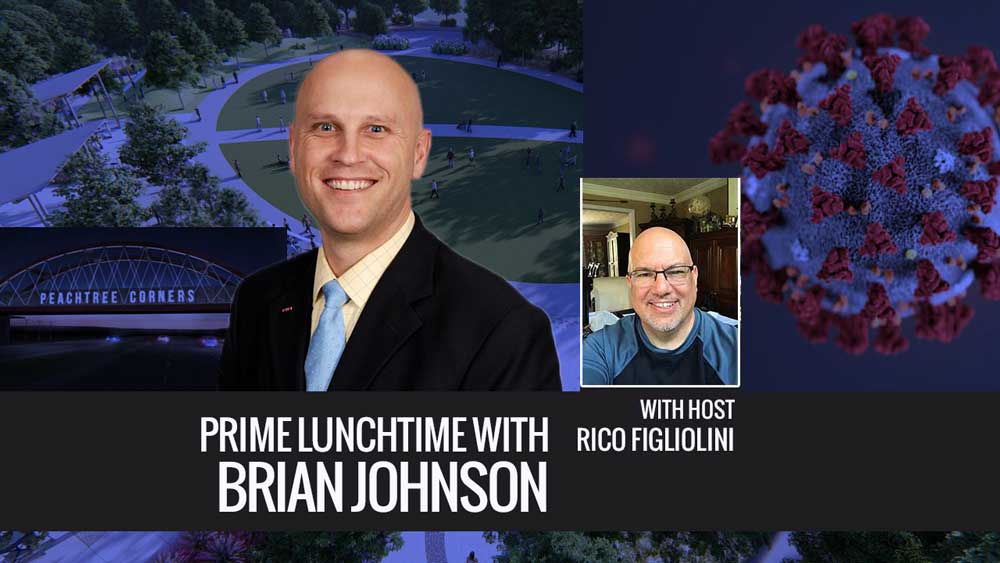
Our monthly podcast with Brian Johnson, Peachtree Corners city manager and your host Rico Figliolini, discuss Georgia House legislation, the pedestrian bridge installation planned for April, the Covid-19 Preparedness, the Night Market coming to Peachtree Corners Town Center and other news of interest. Recorded at Atlanta Tech Park, in the City of Peachtree Corners, Georgia
00:00:30] – Intro
[00:04:36] – Pedestrian Bridge
[00:10:29] – Bills in the State House
[00:15:45] – Corona Virus Plan
[00:24:33] – Town Center Events and Improvements
[00:33:17] – Smart City Expo
[00:46:00] – Closing
“But inside of three years, the car will supplant the phone as the most connected device for it to be, have more connections as it’s doing its thing than a phone. Despite all the apps that we
Brian johnson
have on a phone, it’s constantly connecting… You have a connected vehicle on, you know,
Curiosity Lab as it’s going down the road. It’s talking to the streetlights, it’s talking to the video cameras, it’s talking to the traffic signal. It’s talking to the cars coming the other way, or the car that it’s behind, or your phone as you’re getting ready to cross or the cyclist.”
Podcast Transcript
Rico: [00:00:30] Hi everyone. This is Rico Figliolini, host of Peachtree Corners Life and Prime Lunchtime with the City Manager Brian Johnson. Thank you Brian for Coming.
Brian: [00:00:38] Thanks for having me.
Rico: [00:00:39] This is great. Every month we do this, we get to find out about a lot of things going on in Peachtree Corners. And just to watch up this 45 minutes session, we’re going to be talking a bit about the bridge and when it’s going to be installed. Some state hospitals that may relate to the City of Peachtree Corners. What’s going on in Town Center, the new Night Market, what’s going on, the Curiosity Lab, and of course the Corona Virus information about that, possibly along with the Festival, Fiserv and everything else that we discuss. So we’ll try to get through all of this within the next 45 minutes or an hour and let you know what’s going on. But in the meantime, I’d like to introduce some of our sponsors. So we are in a podcast room in the middle of the City of Peachtree Corners in a place called Atlanta Tech Park. Which was founded by Robin Bienfait, chief enterprise innovation executive officer for Samsung. She’s worked for other companies as well as a high level executive and this hub, this innovation hub that we have here in Peachtree Corners that Robin founded, is a collaborative workspace. 90 plus companies. It actually has an outreach through Southeast through its venture capitalists that are involved with 14 companies as well. Event space here, Financial Fridays, venture capitalists, an organization called Valid Venture that’s here as well. And anything, if you’re a startup or established business, this is the place to be. Even Hargray Fiber, our next sponsor, has had an event here. Just recently, a day ago. So other companies can come here to use these facilities for it’s event space, it’s boardrooms, it’s conference rooms and all that. So AtlantaTechPark.com and simply see to find out more information about them. And this sits on the one and a half mile autonomous vehicle track. Curiosity Labs at Peachtree Corners, right?
Brian: [00:02:40] It does.
Rico: [00:02:41] And 5G enabled through Sprint. It’s a place that provides startups and established businesses a resource and a place of living lab where people driving cars and all that, that they can put their technology to see if it’s working to validate it, to build it for the next generation of IOT. Smart city, mobile technology, anything in that area. That’s what pure and the hub, even though that’s wireless and 5G enabled, that backbone of that has to be brought in from the internet. And that’s our lead sponsor, HargrayFiber.com. Hargray Fiber is based out of Hilton Head Island and they are expanding throughout the Southeast. The biggest thing is to be the local border to enterprise businesses in communities that they want to work in. Thriving communities, places that want to be part of where they’ve been a part of nonprofits and organizations in these communities that they’re going to like Peachtree Corners and all the cities here in the Southeast and around Atlanta as well. So check them out. They provide some of the best services, enterprise level business solutions for managed IT services. Solutions that would deal with internet, TV, and phone, that your local person, local company that can deal with you instead of places that are way too big to call and talk to. So check them out at HargrayFiber.com. Now that we’ve done our introductions and sponsors, let’s just get into what
we’re doing here in the City of Peachtree corners. Brian, every month we do this and there’s always something new and of course there’s always challenges that the city has and stuff, but one of these is the Pedestrian Bridge, and we’re finally, finally getting to the point April, maybe?
Brian: [00:04:36] So you know, right now there are three different aspects of the bridge that are being constructed. The one that we can all see at the location are the two, you know, the two ends where they’re pouring the concrete for the elevator shaft, the stairs to go into the platform’s at the end of the bridge. And then that’s where the two ends, where the Bridgespan itself will be set, you know, will be set into and so that we can see. But then at another location, it’s actually in Fort Payne, Alabama. They’re actually constructing the span itself. It’s a pretty big span, cause it’s a wide road. And so they’re welding all the pieces and it’s, each weld on it has to be inspected by Georgia department of transportation because it’s over their roadway. And so that’s being done there. And then here in Peachtree Corners, a company called IMG, they are doing, they are cutting, doing the precision fabrication of the panels that will go on the sides that are acting as essentially the railing to prevent people from jumping off or throwing things. And that’s the, that’s the signage. And so when you look at it from a distance, it will have holes punched in it such that it’ll say it’ll have the branded leaf from the tree and our logo and Peachtree Corners written across it. When you’re close to it, you know, it’s almost like looking through a screen door. There’s so many holes that you can see through it. You can tell you’re looking through something, but you can still see through it.
Rico: [00:06:31] So that signage is actually going to be on both sides of that bridge?
Brian: [00:06:33] It is.
Rico: [00:06:34] So whether you’re coming up South from Johns Creek or going North into, over the river, you’ll be able to see Peachtree Corners?
Brian: [00:06:42] Yup. So that one’s being cut here. And so there were, around April is when we think that the span will be brought in, and then we’ve got to assemble the panels on the side of the span on. We have to assemble that on the shoulder. I mean, in a perfect world, you would put the, the bone structure of the span into place and then you would have, you would put all the panels up after the span was, but we can’t do that because it would require shutting down 141 for a couple of weeks, and we both know that that will not happen.
Rico: [00:07:21] You’re doing this over a weekend, Friday, Saturday?
Brian: [00:07:23] Right. So we do have to have about, you know, two to two and a half days to set the span in place to do all the welding and fixing, and then get it inspected. And that’s after the panels have already been put on. That’ll be welded in on the side of the road right there. And then they’ll set it in place, and that’s just going to be like a Friday night through Sunday evening. And of course, you know the detour around that section’s not all that far. You just go up Peachtree Corners Circle to Medlocke and right, right back around. So it’s not all that hard. But
anyway, that’s where we’re at. So, you know, sometime in May we think that the span will be, you know in place enough that the bridge looks like it’ll essentially look. Now, it may not be clear to walk across, but it just depends on weather inspections because you just got a lot of inspections before it’s open, so it’s going to be weeks. And then of course, not only that, but then you may actually have the span approved to walk on, but then the two ends have a lot of, that final, you know, the final garnishments put on the outside of it. You know, we’ve got the two, you know, towers have some exterior aesthetic stuff to go to and you’ve got like, you know, LED lights to light up certain things and that takes a while.
Rico: [00:08:57] Is there also a brick, there was no brick walkway. There was going to be designed or that’s not part of it yet. As far as going towards…?
Brian: [00:09:04] So there are some designs out there that have ramps. Going up to the top. No, those are not part of it for a couple of reasons. One, if we did it and you did it to ADA, which is I think a four to one maximum gradient. It requires a lot of material because you can’t go very steep even, you know, to make it handicapped accessible, so to speak. And so it’s about the same amount as the bridge if we did those.
Rico: [00:09:38] I was actually thinking more like, I thought there was a walkway going out towards, into the town center from the bridge. But I think that was…
Brian: [00:09:46] Well there will be two of them. You hit the bridge when you come down by Lazy Dog, that was it. You will be able to take the sidewalk along 141 like you already have that kind of wider multi-use trail that will extend all the way up to Forum Drive. But then you know, we’ve got that Creek that goes along there. There will be another bridge linking up the Indigo Hotel. To the Town Center, but it’ll be back off of 141 and linked up really between Cinema Bistro and the back of the parking lot, so it’s not close to 140.
Rico: [00:10:25] And that’s, that’s later. Anyway, the study of it right now.
Brian: [00:10:28] That’s correct.
Rico: [00:10:29] All right, so let’s, let’s hit into, since the State House is in session, and god knows there’s always, there could always be better things coming out of the state house, session drip things. So let’s talk about some of the bills that might be there that the city would be concerned about or we’re happy about.
Brian: [00:10:46] So, you know, unfortunately, we’ve talked about this before. Most of the time when the general assembly is in session, we’re playing defense. And by defense, it’s usually bills that would erode our ability as a community to have a say in what we do here. And that happens all the time. In fact, you know, just recently, even at the federal level, the FCC preempted local governments from being able to decide where, let’s call small cell or smaller, but more abundant 5G cellular towers would go within the right of way of a city and…
Rico: [00:11:30] We were discussing that. I remember that bill.
Brian: [00:11:32] No, that’s, yeah, though. So the federal government has basically said, these telecommunication companies can put it in the city right away. The city cannot deny. Georgia then went and added some other things, both first, some rights for cities and telecommunication companies, and the ultimate bill, and that is, there’s still a set of guidelines. Still some degree of influence the city can have. But if all the guidelines are met, there are scenarios in which telecommunication companies have a right to put it in the cities right away if they meet all of them. And so it’s, you know, so we have a lot of those. So like right now, there’s some bills that prevent cities from deciding the exterior building material that can be used on certain parcels.
Rico: [00:12:31] I remember the building materials was, was another one.
Brian: [00:12:35] So, you know, there’s a bill that says, you know, the city cannot legislate for a pro, you know, a developer. The type of building material or color that a building could be.
Rico: [00:12:49] So that’s funny cause you used to be, I mean at this point you can, you can’t, and this is how the form was considered. This is how Town Center was created also because the city was left to say those things. So that’s crazy. That’s, that’s like what if your historic downtown…
Brian: [00:13:09] Actually the historic, there was a carve out if you’re in a historic district.
Rico: [00:13:13] Well, historic district, formerly historic district. If the rest of that area is also historic, look, you could still screw that up. But by not having that ability to…
Brian: [00:13:25] You know, a lot of these bills that do things to erode local control. You know, they come from a special interest group coming. You know, usually Atom, like, you know, this could be the, you know, development community doesn’t like cities to tell them what to do. So they lobby it, but they usually, unfortunately have an example or examples, plural, of cities out there that have abused it. There’s usually, you know, somebody who ruined it for everybody. And so I don’t like to sit here and say that all the cities acted responsibly or reasonably. There’s always some unreasonable ones that they cite those examples. But the problem is, is it’s the, you know, adage of throwing the baby out with the bath water so they overcorrect so that one’s one that we’re not particularly a fan of. You know, last year it was successful in removing cities from being able to determine the material made or the material that to be used on structures built within the city. Well, the couple of cities, yes that had, if it was going to be over, I want to say three stories, like four or more. It had to be structural steel and not wood. And the timber industry lobbied and did not like that and said, it’s not fair. And so it was changed to where now cities can’t decide that. And so there’s a lot of those that are happening. You know, it is what it is, but we were pretty, you know, we’re well represented from lots of different angles, so we feel pretty good. You know, some of the bills that we’ve fought against in the past, like, you know,
removing city’s abilities to put fees on the property tax bill, which would cost us a lot of money that hasn’t materialized this session. And so we keep our eye on those kinds of things. So it’s going pretty well. Nothing, you know, nothing in this year that was really, we did not have any local legislation. We did not introduce any local legislation. So nothing that, you know, we were particularly looking to in the last time we did was to charter time before that was the public facilities authority. Not both of which the sky was gonna fall according to some people. And we did that.
Rico: [00:15:45] Yeah. The city’s doing fine now and actually better, I think, for its citizens. This is the way I feel. The next thing on the list is something I’ve been tracking. I’ve been listening to CDCs Televerde things every Friday and Wednesday. Was it Tuesday, Wednesday, Friday. And it just gets more, a little bit more dire each time. And to the degree that we should, that we know the spread will happen in the US as it’s happened in Italy, South Korea, and a whole bunch of other places. We only count in a, it’s not honest Antarctica and, you know, and, and now they’re even talking about community spread, which is not linked to anything from China necessarily. They can’t track it back. So they’re dusting off the 2017 pandemic report they put together to be able to use some of that, to engage the community and mitigate the situation. But what has the city thought about this? Has there been any discussions informally or formally about this?
Brian: [00:16:48] There has, you know, more informally at this point. I mean, meaning it hasn’t been done at a council meeting or whatever, but they have, so we’re just, this morning, my communication director and I got together and she’s going to write up some, some points about this to just kind of let the, our citizens know both where we feel our role is at this point. And just to just be cognizant of things now. And I’ll preface it by saying, you know, right now it’s a health, it’s a public health issue, right? And we’re not a public health organization, so a lot of our information we’re taking from three sources and residents can go there. You know, you start with the County Health Department, they have information about this kind of stuff out there. Then you’ve got the Georgia Department of Public Health, which is another organ, and then you’ve got the CDC, which you know, is tasked with this kind of stuff. And of course, you know, we here in Metro Atlanta, kind of consider that our own anyway, but we track those three organizations too. There’s a lot of, you know, reuse of the same information, but our, you know, we’re taking our lead from them as far as what precautions should be taken, how, you know, how serious the risk of, if you know, spread is all that kind of stuff. Now, much like anything else, the spread of anything else, you know, being diligent about washing your hands if you’re sick, you know, covering coughs or sneezes or if you don’t feel good, don’t go into public places where you could, you know, type of thing. Where we’re, our role will really come into play if there is some sort of an outbreak here and now there needs to be the regulation of activity within the city limits. You know, meaning there needs to be, you know, if the schools need to be let out early or not let out or whatever, you know, we can help facilitate that. If news needs to get out or certain public service announcements, we are in a unique position to do it. If you got to close roads or close up this or that, you know, we’re, we’re, but, but we’re going to still take our lead from other organizations and merely be there. You know, their support for our local community
because it’s still, it’s going to be a public health crisis if it gets there. And so we’re gonna, we’re gonna listen to the public health organizations and say, we’ve got to do X. And if it…
Rico: [00:19:20] And there’s also, I would imagine at some point though, there has to be some plans for if there is a spread and city government can’t meet on a regular basis and how that would be done and how, I mean, we have limited government services. That the city has, puts, I mean, what police take care of things. I’m sure that they have plans in place, hopefully, EMT, fire department. So, I mean, this city is fortunate. We don’t have necessarily a lot of services to deliver, but if the city council has to meet and if there was a spread or things happened here, I would imagine there’s some things that you may be able to want to do?
Brian: [00:20:01] Oh, there are, I mean, so first of all, our charter, you know, taken after the, really, the model city charter, league of nation or league of nations, league of the Georgia municipal association publishes every year. It’s been around for many, many years before technology existed. And so there are emergency powers that both myself and the mayor have in you know, in times of crisis in which either in some cases, both of us may have certain authorities to, you know for certain things, make purchases without, you know, doing public bids. I may need to kind of suspend some of the public, you know, financial guidelines and restrictions in these certain crisis periods. And so that’s already in place. But nowadays, with the exception of maybe if we lose electrical, you know, that kind of thing. But our ability to remotely meet is, I mean, I’m daily now having video teleconferencing meetings. Daily.
Rico: [00:21:19] Will the city council hold its own…?
Brian: [00:21:23] Absolutely. And, and so if, and again, during times of crisis, you generally don’t have, they, the powers that be understand that you’re not going to be able to get everybody together, right? So again, that’s why it temporarily can give a person more authority than normal. But even if we needed to, again, that technology has become so pervasive that, I mean, you could, you could have a FaceTime public meeting, let alone, you know, at City Hall, I can end up having every member come up on one screen and they see the entire room and just do it from there so that you don’t have to get together. You don’t have to subject yourself to maybe sick people or whatever, but you can still conduct business, business of the city. So we’re not too worried about it, you know, as far as our ability to conduct business. But we, you know, when it comes to things, we’re definitely there to support the public health organizations that are going to end up guiding the actions. I think we’re probably no dissimilar to any other government, I would think they’re going to take their lead from.
Rico: [00:22:35] Yeah. And I think, you know, individuals in corporations, I mean, some of, some of the larger companies are actually planning on things and listen, even for, you know, and I look at what I do, I mean, I could telecommute almost all my work, for example, a coffee or something happened and you know, we’re not China. This is not a dictatorship. You’re not going to close down a city of 2 million people and quarantine them the way China did, and they were able to lock down that, that spread, that won’t happen here like that. The spread here will no
doubt be wider, I believe in. Obviously the CDC believes that too. That will definitely be wider here because we don’t have the same culture and the same limit of freedom.
Brian: [00:23:17] Or ability to limit.
Rico: [00:23:18] The ability to limit freedom. Cause that’s what China was able to do. And that’s why people are saying, wow, it didn’t spread that, well that’s because of that.
Brian: [00:23:28] Although, yeah, although you know, others are arguing that their ability to restrict personal freedom did translate into the restriction of the flow of information and that this got bigger than it needed to be at the outset because they kept it under wraps.
Rico: [00:23:46] For about three, four weeks.
Brian: [00:23:48] They had multiple physicians that were treating the first patients that have passed away themselves.
Rico: [00:23:56] You know, one of them was trying to get out the information when he was, a young guy and passed away. So just keep vigorous attention to what’s going on.
Brian: [00:24:05] Wash hands. Be cognizant of the violation of space of other people. Or theirs of yours.
Rico: [00:24:12] Be respectful.
Brian: [00:24:13] Yup. Be respectful and again, you know, if you think if there’s any doubt. Don’t go to public places. If you don’t feel great or whatever, and maybe it’s nothing, maybe it’s a common cold, but…
Rico: [00:24:25] The regular flu.
Brian: [00:24:27] Or the regular flu, which still kills a lot more people than this.
Rico: [00:24:33] In the scheme of things, the fatality rates lower way lower, but. You still shouldn’t be spreading stuff. You shouldn’t be spreading. Okay, all right. You know, there’s also Town Center. If you’re on, hopefully it’ll get warmer at some point.
Brian: [00:24:46] And stop raining.
Rico: [00:24:47] And stop raining, yes. We might actually enjoy Town Center at some point, so I know that I saw the release of the summer movie schedule that’s going to start in June, so that was cool. When there’s also a bunch of other events, including the night market that’s going to be starting up. So what else was going on there? I mean…
Brian: [00:25:06] Well, before we get into that, you know, over the off season we made some decisions and, and moved forward with some plans based on what we learned after the first year. First season, so to speak. One is if you’ve been out there recently, we have, we are permanently building the stage much higher. So that we don’t have to rent a stage, you know, from before because there are people who are saying it just wasn’t quite high enough.
Rico: [00:25:36] Yeah. It’s coming along here in the back.
Brian: [00:25:39] Right. And so we’ve got new playground equipment coming in.
Rico: [00:25:45] Nice. With hopefully sheltering stuff from the slide.
Brian: [00:25:49] No, not the playground equipment. It’s just a climbing stuff and all that kind of, you know…
Rico: [00:25:55] I remember people complaining about the metal slide.
Brian: [00:25:57] Oh, well no, that’s part of that. Now we have a cover for the slide that’s been ordered too. Believe it or not. I mean the lead time on both of those are like nine weeks. I mean, I was just like, what? But anyway, those are coming. So you have a slide that will be covered in the heat. And then we’ve got more playground equipment coming, more things to do, you know, for the kids to do at the back there. And you know, we got some more lighting going on out there. We’ve got the trail leading through the woods, that little trail for parking out there for events where people park off of, what is it Divinci Quarter. And so we’ve got a number of kind of permanent upgrades that we’re doing out there to support. Like you said, we’ve got a movie schedule that came out. We’ve got a sports viewing schedule that’ll come out shortly about the kind of events that we’ll have out there. Again, the big screen. Then we announced this year, for the first time a night market and night farmer’s market.
Rico: [00:27:04] I’m curious about that.
Brian: [00:27:05] Well, so when we’re looking at who we might be competing with outside of the area or in the area, outside Peachtree Corners and not wanting to step on anybody’s toes or try to do something that you can get somewhere else. There’s a few cases where there had been night markets and they’ve worked well. So we thought, you know, we can do it on, I believe it’s going to be a Friday night, once a month, like 6:30 to 9:00, six to nine, something like that. And we thought it’s a good way to finish the week out. Go out there and you know, get some people now. And then it also prevents the venders from having to choose if we were doing it. So now they can do ours, and then the next day they can go somewhere else. There is not, okay.
Rico: [00:27:58] Yeah, I haven’t heard of it. And usually it’s Saturday mornings.
Brian: [00:28:01] Correct. Or Saturday afternoons or all day Saturday or whatever. But no, this one. And you know when you have a facility that has the lighting that ours will cause, you know, we’re adding more lighting right there for the, you know, the middle green area town, green area. It, you know, it’ll, it’ll be a good, helps the businesses out there. It’s more people out there and something to do. And, and it’s fresh, you know, vegetables, fruit, other things for people to, again.
Rico: [00:28:29] There’s new restaurants that fire. Fire pizza, Fire…
Brian: [00:28:36] Stone or something.
Rico: [00:28:37] Firestone Pizza. That’s it. Not flying birds, which is the restaurant just about. Although we did have a closure to the coffee shop closed.
Brian: [00:28:45] Revelator.
Rico: [00:28:47] Closed or something.
Brian: [00:28:49] They closed multiple locations.
Rico: [00:28:51] So it wasn’t just the only one. They supposedly expanded it too fast. But a good.
Brian: [00:28:58] And then Uncle Jack’s Meat House is being constructed.
Rico: [00:29:02] It is going to have a truck at the food truck. I think. No, you guys are gonna let him, cause he’s doing this food truck going around some of the properties. Sounds like, I don’t know if you heard about that, Uncle Jack’s food truck. Sort of give a, give a taste of Uncle Jack’s Meat House.
Brian: [00:29:17] Where’s he riding it right now?
Rico: [00:29:18] You know, I’m not sure. I’ve seen the picture of the truck and I heard that it’s going to be around some, I’m not sure if it’s just the festivals. Well, if he’s trying to, like, if he might even want to bring it to Town Center before it opens.
Brian: [00:29:32] I, I mean, I think we can surely facilitate that. And, you know, we definitely, you know, just open it up to where you can have it in the tech pocket. And then, you know, for events, we have lots of food trucks, I mean, under a special event permit. So, so trucks are up, you know, becoming more and more popular for sure. And so we want to do what we can to facilitate that.
Rico: [00:29:54] And we’re gonna talk about food trucks and food and stuff. The, can’t wait for the festival piece. Recurrence festival is actually moving from where we are. It’s been for years. Well for several years to a consultative.
Brian: [00:30:08] Really quick. Was it ever at a location other? Then I don’t think. Since it’s good to, yeah, in a sense, it’s inception. So yeah, it’s moving over to the town center area, so it’s really going to be a combination of before when you were out on whatever that road was around there was that. Was that by?
Rico: [00:30:32] Marriott Queen is behind there.
Brian: [00:30:33] And Comcast… But you know, all the things that you had, you saw on the road at the last location will be on the section of Peachtree Corner Circle between 141 a memoir. So maybe even between the DaVinci Court entrance and Medlocke, that’ll be where they’re set up the car show.
Rico: [00:30:57] There were two car shows there actually.
Brian: [00:30:58] Right. And so, and so, you know, that’ll be used similarly. And the bands and the vendors there to shoot trucks will pull right there just like it kind of was on the road. And then the concerts and other things that you normally had, and if you’re on the group will be on the town green.
Rico: [00:31:16] What about some of the other…?
Brian: [00:31:17] Kids’ area will potentially be, I want to say that might be on the top deck of the top level, the parking deck.
Rico: [00:31:26] Okay.
Brian: [00:31:27] And so, but you know, there’s enough space, but you know, it’s the first time and you know, you got to move it around, but that’s why we built it. You know, our, our permanent establishment there will benefit from it. Well, for sure. And it’s a great gathering place. It’s got, you know, parking opportunities.
Rico: [00:31:45] Great for people that don’t even know if that counts out there. Right there would be coming to the festival and say, wow, I didn’t know this was cool. Great. So we have that going on. Fiserv they’re doing demolition and planting trees.
Brian: [00:32:00] I mean, Fiserv, you know, so that, that, yeah, it’ll be Fiserv property. So that age restricted, active adult community is well on its way. They’ve demoed almost all of the old buildings that were on there, and now they’ve already started planting the trees that are going to be buffering that property from neighboring residential properties. Which were part of the, one of
the conditions replacing the fence that was in existence had been put there many years ago. Along the river field subdivision property. And they’re getting ready to, to start doing some site prep. So you’re now you’re going to, you know, there’s going to be some bulldozers and earth moving equipment as they get pads prepped to, you know, to put yet to put some buildings on. There’ll be some tree removal. Mostly what I think are worthless you know, loblolly Pines, which are really tall, but have almost no shade value. And, you know, there’s a lot of those on there, but, you know, all within the permit, within the river corridor. So it’s all, you know, it’s all of…
Rico: [00:33:11] In the building and phases anyways, and I love picking out something that they’re not building.
Brian: [00:33:16] That’s correct.
Rico: [00:33:17] All right, cool. So we’ve, let’s, let’s talk a little bit about Curiosity before we get to that Smart City Expo that that city was involved in last year. Are you guys going to be returning to that? That’s going to be in June.
Brian: [00:33:35] It is. We are a part of it. Well, we’re trying to figure out is the best thing to do potentially the afternoon before. Just because last year we had our grand opening. And it was, you know, over 500 people. Like I said, we’re not going to replicate that and, but we’re trying to figure out what’s some good things to have and we’re kind of, you know, smoking over a few options. But we’re gonna, we’re going to do something unique up here. And then, yes, I have been asked to speak at the conference down in Atlanta, and we’ll have a booth down there with Sprint again, and you know, so we’ll be active in it. We can’t not be, you know, and Aarti Tandon the founder of Smart City Expo Atlanta’s a great partner of ours, and. You know, she wants us involved and we want to be involved. And she’s, you know, there’s a lot of things that her and her team learned last year that, you know, pretty excited about how they’re gonna resolve or improve on those things that they were like, Oh, he didn’t know. I mean, so it’s going to be a good one.
Rico: [00:34:45] It’s always a learning curve. Doing something for the first time. And Brandon, he’s going to be speaking at MIT.
Brian: [00:34:54] Yeah. You know, so we’re starting to get, you know, some invitations to people you know, within this process that are pretty impressive. You know, Betsy Plattenburg, the executive director of Curiosity Lab has been involved in a lot of the local, like the technology association of Georgia Tech. And, and her Georgia Tech ties, she’s a former employee there, but then, you know, she’s been asked to speak and do some things down there and pretty impressive. And then, you know, outside of tech and Betsy’s involvement there, you know, Brandon, who became the city’s chief technology officer because of both our deployment of smart city technology citywide, but also within Curiosity Lab. You know, his technical expertise in some of these areas that are at the kind of cutting edge got the in, got the, I guess, interest and peak, the curiosity, pun intended of some people in that arena. And there’s a conference, I
can’t remember which one is, but he was asked to speak at MIT. So he has been asked to speak there on some stuff here. And so, yeah, we’re showing the flag pretty well. And, you know, we feel, the innovation center, you know, Betsy Plattenburg and her associate director, Caitlin Ferguson, they were, dealing with a, program for startups through the European union. And we’re going to essentially have a program in the summer in which it’s almost like an internship for startups where companies with multiple people will come into the innovation center and spend some time. And these are companies that are members of the European union that are coming over here and looking to maybe expand a proof of concept, you know, into a, or test their proof of concept or expand it demonstrated in North America and use. Our facility is an opportunity to do that. So just little, lots of little unique things to…
Rico: [00:37:01] Your, where everything is from, coming from around the world.
Brian: [00:37:04] Right. And then it will be three corners, and then, you know, you’ll get an invite for this. But here in a couple weeks, I believe it’s March 16th, we’re going to kind of have our kickoff event for the Teleoperated E-scooters. And we’re going to, so we’ve deployed a few of them right now. Those are E-scooters that are off the shelf. E-scooters, but they’ve been retrofitted with a camera and training wheels.
Rico: [00:37:32] So when does that happen?
Brian: [00:37:33] And so I believe it’s March 16th is where we’re going to have a big day to where we’ll, and you’ll get an invitation cause we want you to, we’ll have kind of a demo. We’ll talk about how this technology is going to. Hopefully be used to resolve some of the E-scooter issues that we’ve seen in Atlanta or elsewhere, which is, you know, scooters just left wherever. And in this case, this company can have people from a distance drive these things without somebody on them, including an app. There’s an app that you can summon an E-scooter like you would an Uber, and the company that has the teleoperation component, which is called Tortoise. They have a teleoperations center in Mexico City. So there’s somebody in Mexico City that logs in to the camera and, and the, you know, little mini computer on the scooter, and then he or she takes it over. Drops the training wheels and then drives it to certain places, whether it’s to come pick you up, and then you jump on it and then you drive it like normal. But when you’re done, you leave it there, then they can drive it maybe to the next place to pick up somebody or to a docking station or what, but that they don’t have to get a truck, a couple of guys and drive around the city every night and picking up the scooter.
Rico: [00:38:56] Lengthen the threat because moratorium still on that, right?
Brian: [00:38:59] Yep. So, yeah. So you know, we’ve got some pretty cool stuff that are getting ready to, you know, you’re going to see on the tracks. You’re going to see scooters, driving around with nobody on them in the test legs. But for those who want to do it.
Rico: [00:39:14] There’s also, there’s also so much going on when you, you know, when we were talking before the podcast, but technology with the, I mean, someone has to repair some of these things, right? So we’ve talked about when Tech and Curiosity Labs, you know, maybe a new automotive program, teaching kids or adults maybe to repair some of these things too.
Brian: [00:39:39] So we never think about this, but you know, so we’ve got auto mechanics that exist right now, right? And you know, these people, these, you know, kids or you know, adults, whatever, but they go to school, they’ll go through a certain, you know, amount of training. At the end of it, there’ll be a certified like Honda mechanic or Mercedes mechanic and you know, they’re certified to work on certain things, and we think about that. I would take it for granted, but think about all the technology that over time gets invented, or in the case of autonomous vehicles, it doesn’t really exist on any other vehicles. And so at some point before too long, there are going to be people who are going to be needed to fix those devices that are unique to these advanced vehicles. LIDAR is a great example. You know, it says a unique type of radar that these autonomous vehicles use to read the roadway. Well, they’re not on any human driven cars, so if it goes down, where do you take it? Right? Well, Gwinnett Tech is creating a curriculum for people to go through and get certified to repair those devices. And we’re talking to them about maybe Curiosity Lab being a part of the curriculum for these students to go and maybe get real world, you know, exposure to this kind of stuff at our laboratory that they would not be able to get if they were just in the maintenance phase or just on computers
Rico: [00:41:03] For sure. And it’s a move that a lot of County school systems are looking at too. Because, for example, in Pronet County, I forget the name of the high school now. It’s a theme task school, similar to Paul Duke STEM and such, but their theme is an introduction of AI technology and teaching young kids, high school age kids to be able to program and work in an AI environment. This just came out just recently. And I think the Gwinnett Daily Post has a post on it. Just this week I saw the article. And it’s amazing to me because it, you know, makes sense. I just never, you know, when you’re not thinking down that line, it’s like the Coronavirus everyone thinks it’s, it’s a disease, you know, and this and that. But they don’t think about the economic impact that something like that has. So, you know, when product can’t be delivered component stuff, all the products can be delivered. I mean, 80% of us go for tantra, but 80% of our pharmaceuticals, the 80% of the active ingredients of our pharmaceuticals come from China, for example. And I think 70% of the antibiotics come from China. People don’t think about that. Is that something that would be in the now? Unless you’re, you know, that stuff and it’s just amazing to me. But we are teaching kids to be able to, to work in that environment in 20, by 2030. A kid graduating from a high school, even a college level, probably even high school, because it could almost be like the vocational schools of decades ago where they’re graduating, they know AI and they can work in the robotics industry and programming and all that. Just because that’s where it’s going. I mean, you need to be able to know that stuff.
Brian: [00:42:53] I’m challenged all the time. You know, I have younger kids. Is, you know, how much technology do you let them be on for them to be tech savvy, where I know they’re going to have to be, but yet, how much is too much?
Rico: [00:43:04] Yeah. Well…
Brian: [00:43:05] I mean, it’s, it’s a struggle, but, you know, I get blown away all the time. I mean, you know, here’s another one. I didn’t realize, you know, what’s the most connected device in society right now? But inside of three years, the car will supplant the phone as the most connected device for it to be, have more connections as it’s doing its thing than a phone. Despite all the apps that we have on a phone, it’s constantly connecting. The car will supersede them, you know? And when you think about it, you’re like, okay, that kind of makes sense because, again, like Curiosity Lab the city street of the future. You have a connected vehicle on, you know, Curiosity Lab as it’s going down the road. It’s talking to the streetlights, it’s talking to the video cameras, it’s talking to the traffic signal. It’s talking to the cars coming the other way, or the car that it’s behind, or your phone as you’re getting ready to cross or the cyclist. There’s overtaking that can happen to Curiosity Lab right now. That’s a lot of connectivity.
Rico: [00:44:15] And this is why the lab allows that test.
Brian: [00:44:18] And that’s why you need 5G too, because there’s just so much.
Rico: [00:44:22] So there’s not a delay in…
Brian: [00:44:24] Correct. And latency. And so, yeah, I mean, so society is changing very quickly and I’m glad I don’t have to be the one to have to know how to do all this.
Rico: [00:44:34] You can hire those people, but you know, and, and you know, we have to, we should all, you know. When we think about these things, we should slow it down a little bit. And also think about what that means because everyone thinks, well, you know, a self driving car. It’s going to be right here. Tesla’s doing it. Their cars are actually enabled to be able to do that level four, level five, four at this point, right? So they’re enabled to be able to do that. That’s just not their enabled yet, but they can’t do that. But there’s also different types of vehicles, delivery vehicles, food delivery vehicles. You know what, I may not be the dominoes kid, pimple face kid dropping off the box now.
Brian: [00:45:14] Or it could be, it could be a small box on the sidewalk that went up and delivered or could be a drone that delivers it to a kiosk. That is in an apartment complex. And then when you get a notification that your order had you walk up to it. Your phone goes there and then a certain compartment where your order was dropped into. You pull it out and walk back to your apartment. And it’s being tested right now.
Rico: [00:45:38] And if you look at Sapphire and stuff like that, you’ll see like even even, you know, van sized Thomas vehicles driving up where you can like their food, they essentially food vending machines. I could drive up. That could be half that size. You get your pizza around or if you’re working, that’ll be your food truck itself.
Brian: [00:45:58] Yeah.
Rico: [00:46:00] All right. We’ve come to our time with Brian. I don’t want to be taking too much of your time on this, but we’ve covered a lot and there’s a lot going on in the city and around the city and more to discuss as the months go by. Certainly as we get into it, let’s hope we get it to warmer weather, and dryer weather would be nice.
Brian: [00:46:17] And you know, a lot of activity. I mean, you know, this city over those months, you know, before too long, you’re going to be getting into the spring, spring breaks, lots of families traveling, and then the school year ends and you’ve got, you know, baseball season just started opening day is a week from Saturday at Pinckneyville park. We come Saturday.
Rico: [00:46:42] Let’s hope it’s warm enough.
Brian: [00:46:44] No, I got practice tonight and I’m like, yes, that’s 7:30. I mean, so, you know, I’ve got to coach, you know, my son’s team and that, and so, you know, but before you know it. It’d be nice too doing that swim, you know, swim season starts in the neighborhood. Swim season starts. I mean, it’ll be here before we know it.
Rico: [00:47:03] So once you guys are looking for our next issue, the April may issue, our main stories are going to be about youth sports. We’re gonna be covering baseball, softball, middle school soccer, and the soccer league. We have a bunch of things we’re going to be covering in that issue from sports and along with other, all the things we pack that we pack every issue we try to anyway. So feel free to look at LivingInPeachtreeCorners.com to find out. The latest digital edition you can find online if you haven’t gotten it in the mail or if you don’t live in the city and you want to be able to see what it looks like. And if you want a copy, call me, email me, and I’ll send you a copy of the magazine. It’s editor@livinginpeachtreecorners.com. If you want…
Brian: [00:47:50] City Hall has extra ones.
Rico: [00:47:53] And there’s 130 odd places, you can find it at. I know Dunkin donuts has it, Ingles, library. There’s a variety of places so you can’t really miss it. Thank you for joining us. Appreciate it. Thanks guys.
Related
City Government
Crime and Safety Concerns Dominate Town Hall Meeting
Published
3 weeks agoon
March 27, 2024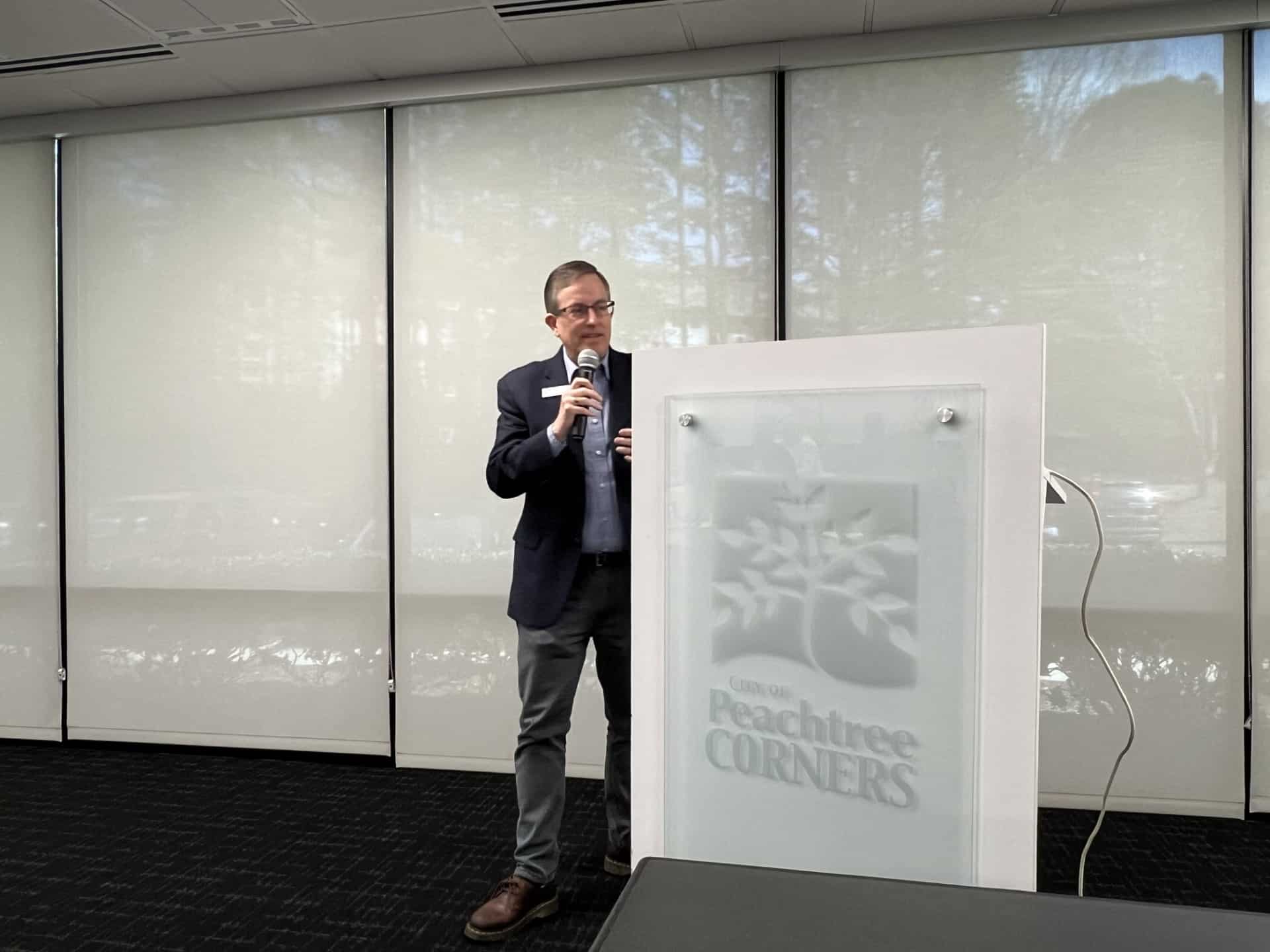
Besides his monthly newsletter, Peachtree Corners City Councilman Eric Christ occasionally hosts town hall meetings to allow constituents to catch up on what’s going on and give him feedback on a variety of issues.
On Sunday, March 24, several dozen residents and stakeholders gathered for updates at City Hall’s Community Chest room. Christ probably expected the gathering to last 90 minutes at the most, but the discussion lasted nearly three hours as he shared information about the Marshal program, development projects, the new dog park, deer and the May 21 primary election.
Cutting down on crime
Probably to nobody’s surprise, crime and public safety took up the bulk of the meeting. Christ wanted the audience to take away that crime in Peachtree Corners is down 25% from pre-pandemic times. He showed a chart with crime rates from 2019 through 2023 that showed a significant drop in crime overall.
- Residential burglaries are down by 48%.
- Thefts are down by 34%.
- Robberies are down by 24%.
“Prior to the pandemic in 2017, 2018 and 2019 we were averaging about 100 total [part one crimes] every month, and that dropped almost by half during the pandemic. Then, in 2021, it went back up a little bit again,” said Christ.
Even though the rate has increased year over year since 2020, it has not returned to pre-COVID levels. However, compared to the previous year, crime has increased by 23%. One solution may be the new City Marshal program that kicked off in November.
Having a relatively small population, the most heinous crimes, such as homicide and aggravated assault, have stayed lower than in many other areas. However, auto thefts, car break-ins, robberies and other property crimes remain somewhat high.
The City Marshal’s involvement
Chief City Marshal Edward Restrepo gave anecdotal evidence that the marshal program is working and will continue to get better because it fills the gaps left between the Gwinnett Police Department and the city’s code enforcement department.
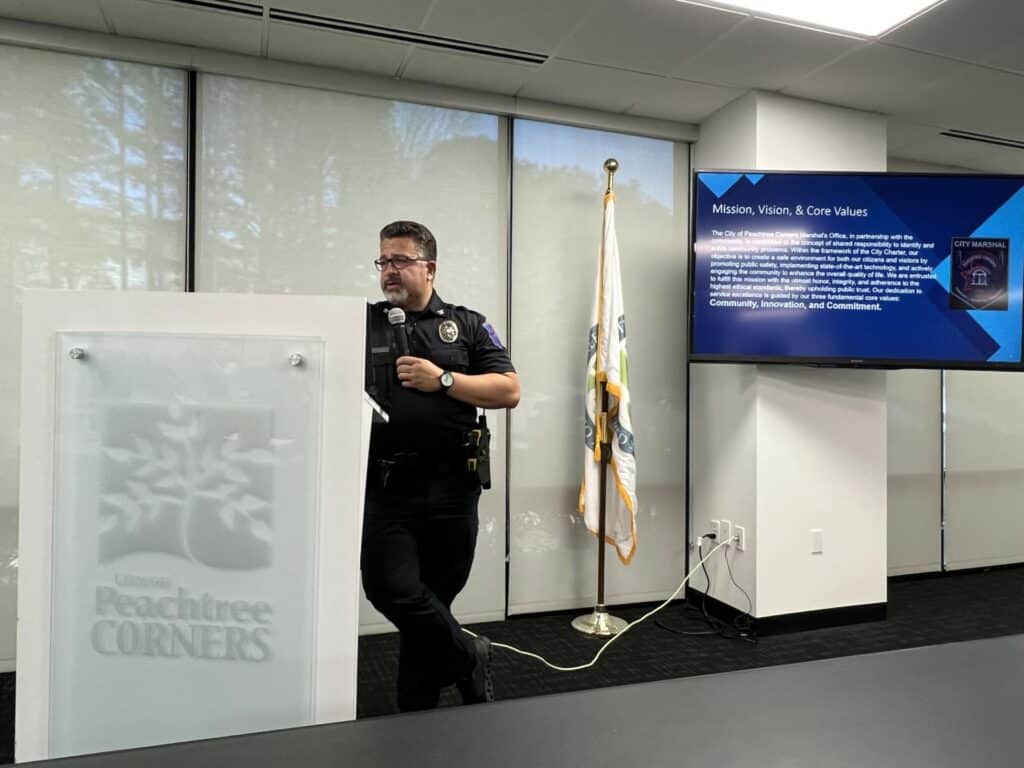
“We had a jewelry store robbery, and about the time we came in, we had started building up the camera registry as well as the integration system of cameras all around the city,” said Restrepo. “With only three of us, we have to rely on technology as much as we can.”
Although the marshals didn’t apprehend the bad guys, their assistance helped other law enforcement officers do their jobs more effectively. Several residents asked if there were plans to increase the marshal force to provide 24-hour, 7-day-a-week service.
The initial cost was around $900,000, said Christ, and maintaining the three officers and an administrative assistant will require about $700,000. Although Peachtree Corners doesn’t levy a property tax, the city’s share of county taxes goes toward that type of expense.
“It’s up to the people of Peachtree Corners if they want to increase the program,” said Christ. “It will come at a price.”
Those in attendance indicated that they thought that would be money well spent. Several said they liked seeing marshals at city-sponsored events because it sent a message that Peachtree Corners is serious about keeping its residents and visitors safe.
Christ said he and the rest of the council would consider that, but he reminded everyone that they should still report crimes to the police.
“I’ve had people tell me that they left a message on the city’s answering machine on a Friday evening and hadn’t heard back,” he said. “I tell them the first step is always to call 911.”
Catch the episode of the UrbanEBB podcast featuring Edward Restrepo from this past January here:
Related
City Government
Ora B. Douglass Swears in as First Black Female City Council Member of Peachtree Corners
Published
3 months agoon
January 20, 2024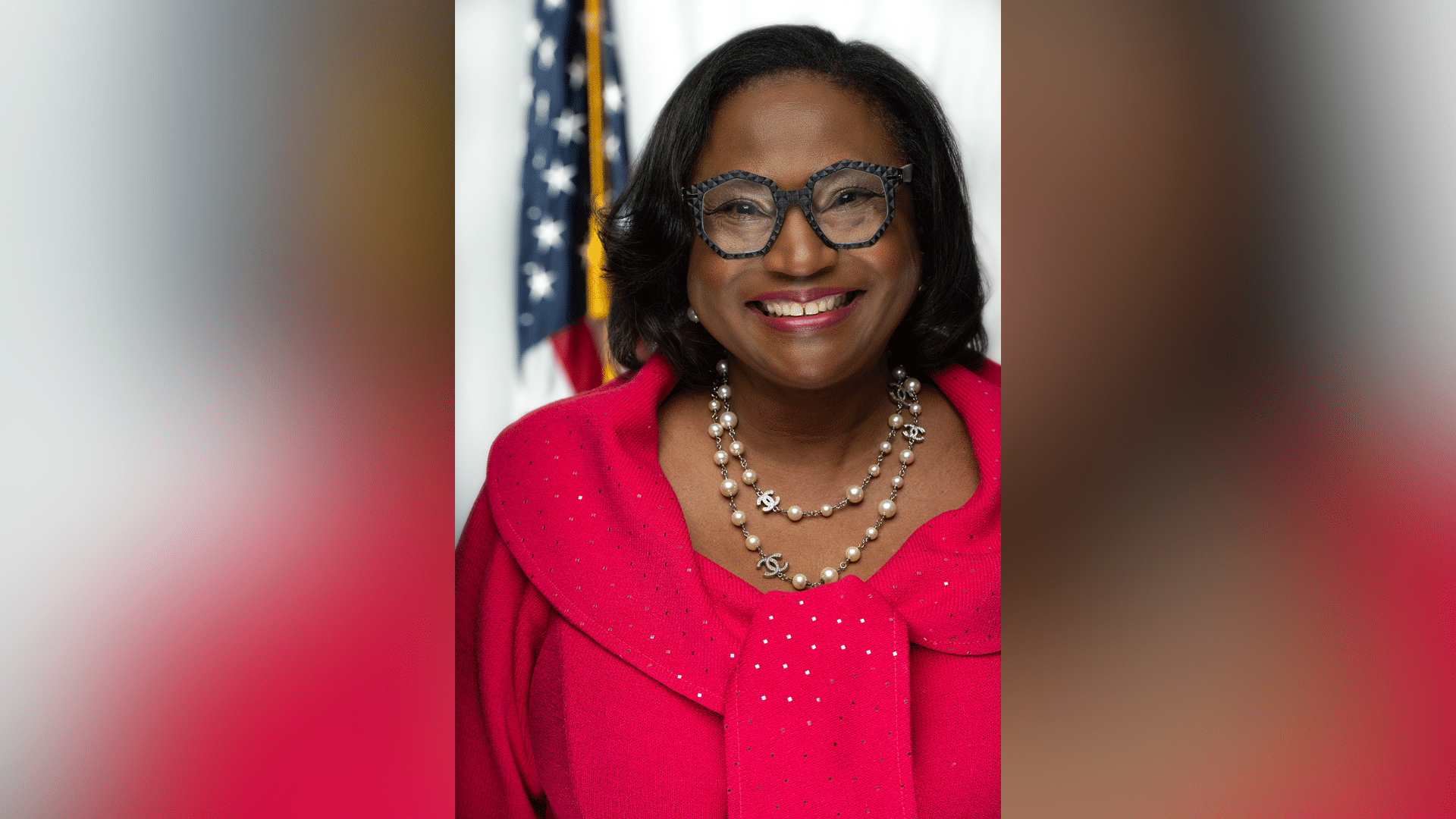
After a successful run for the position of Peachtree Corners City Council Post 5 Ora B. Douglass will be sworn in as Peachtree Corners’ first Black female city councilmember on Tuesday, Jan. 23 during the regular City Council meeting.
Upon her retirement, Douglass was elected to the seat vacated by Lorri Christopher, one of two females to serve on the Peachtree Corners City Council, the other was Jeanine Aulbach.
Douglass’ inauguration continues Peachtree Corners’ commitment to diversity and inclusion by not only electing its first woman of color, but by recognizing her status as a military veteran and an advocate for better health care, education and quality of life for all.
She earned her Bachelor of Science degree in nursing from Florida A&M University and earned a Master of Nursing degree at Emory University.
After graduating nursing school, Douglass was commissioned an officer in the U.S. Army Nurse Corps. A veteran with over 13 years of service, she has been stationed in Hawaii and was part of the U.S. Army Reserves.
Douglass has chaired the most recent Veteran’s Day event in Peachtree Corners and looks forward to more efforts to recognize and celebrate the multiple cultures and contributions of the residents.
With her long history of community service in the area, her motto has always been “service first.”
In 2014, she led a group of members in chartering the Psi Omega Omega chapter of Alpha Kappa Alpha Sorority Inc. in Peachtree Corners where she served as president for over four years.
Psi Omega Omega chapter provides community service to Peachtree Corners residents from high school students, senior citizens, entrepreneurs and those in need. In addition, the sorority has partnered with Gwinnett County to keep 1.6 miles of road clean on Peachtree Corners Circle.
Douglass also established The Georgia Pearls of Service Foundation (GPOS), a 501(c)(3) fundraising arm of her chapter and serves currently as president of the foundation.
The GPOS foundation raises funds each year to provide scholarships to high school students and donations to selected community service organizations.
Douglass was appointed International Chair of Community Programming, a committee with representation from the 10 regions of the AKA sorority in providing direction and oversight of the program from 2018 to 2022.
The program defined the framework for Alpha Kappa Alpha’s commitment to service that is embraced by its 300,000 members and over 1,000 chapters located throughout the world.
Douglass and her team partnered with Walgreens and traveled to 36 states including a Native American reservation and to the country of Honduras during the COVID-19 pandemic.
The group administered mammograms, COVID vaccines and provided testing to low-income citizens.
Douglass was born at Atlanta’s Grady Hospital, but was raised in Fort Pierce, Florida. Orphaned at 18 months old, Douglass hasn’t lived a charmed life.
She has worked hard for her accomplishments and knows the importance of a good education, perseverance, dedication and service to all mankind. She promises to utilize these qualities in service to the citizens of Peachtree Corners.
She has worked at numerous hospitals in the Atlanta area including Emory University, and Grady Hospital.
At Northside Hospital she was vice president of Quality and Risk Management. She served as director of Community Home Based Nursing at the Veterans Administration Medical Center in Atlanta and VA Medical Centers in Carrollton and Oakwood where she directed a $10 million grant to provide homecare services to our veterans.
Douglass has practiced progressive clinical, managerial and healthcare administration for over 30 years.
Douglass currently serves on the board of the Fowler YMCA in Peachtree Corners and is also a member of the Peachtree Corners Rotary Club. Douglass enjoys playing pickleball, traveling, cooking, gardening and providing boxes in her yard for Eastern bluebirds to nest each spring.
Douglass is married to Dr. Adrian Douglass. They have four children and three grandchildren. She and her husband are members of Friendship Baptist Church in Duluth.
For more information, go to www.peachtreecornersga.gov.
Click here for more Peachtree Corners City Government news.
Related
Business
The Mayor’s Look at Business and Innovation Successes in 2023
Published
4 months agoon
December 29, 2023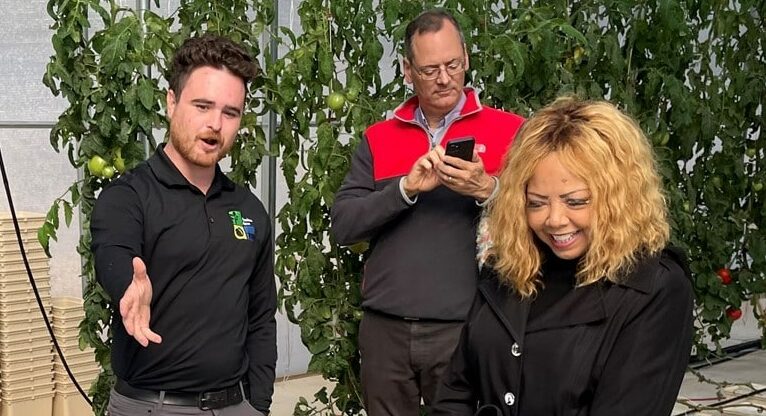
From Peachtree Corners Mayor Mike Mason
As the year comes to a close, it seems like a good time to consider our businesses and say ‘Thank You!’ for helping to ensure our city’s success.
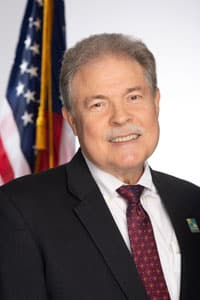
Business and innovation have always been at the heart of who we are as a community. We are a city that grew up organically around Technology Park. So, as we look back at 2023 at some of the many occurrences worth noting, I’d like to say ‘Thank You’ to our businesses, large and small.
And ‘thank you’ to all those entrepreneurs out there who had the courage to start their own businesses and put in the countless hours needed to make them successful. Without your success, we wouldn’t be here. Let’s look at some of the business activity in 2023.
In January, Fricke and Associates, a certified public accounting firm, consolidated two locations, bringing 25 new jobs and a $800,000 capital investment to the City of Peachtree Corners.
The firm signed a 9,000-square-foot office lease at 3500 Parkway Lane to help them better serve Metro Atlanta clients.
Early in the year, NAC International, a nuclear fuel cycle technology and consulting company, signed a deal for 23,000 square feet of space at 2 Sun Court in Peachtree Corners, while T-Mobile partnered with Curiosity Lab for a fun student hackathon the weekend of Feb. 24 to 26.
The city completed its second, five-year Economic Development Plan, this year. The plan guides activity, projects and policy aimed at improving the city’s economic climate.
The city also began its next Comprehensive Planning process, a plan renewed every year that guides development and redevelopment activity in the city.
Unlike other places, these plans don’t sit on a shelf here. We talk with our stakeholders, i.e. YOU, and develop plans to take us where you think we need to go. This is good old-fashioned logic at work, but back to our Year-in-Review.
Last January, city economic development staff visited a company in Peachtree Corners rather unsuspecting of the scope of the operation.
Guardian Sports manufactures products designed to keep people— especially young people—safer while playing sports. It is truly a gem. This Peachtree Corners company is designing and manufacturing sporting equipment worn by youth and high school football teams, college teams, and most recently, mandated by the NFL.
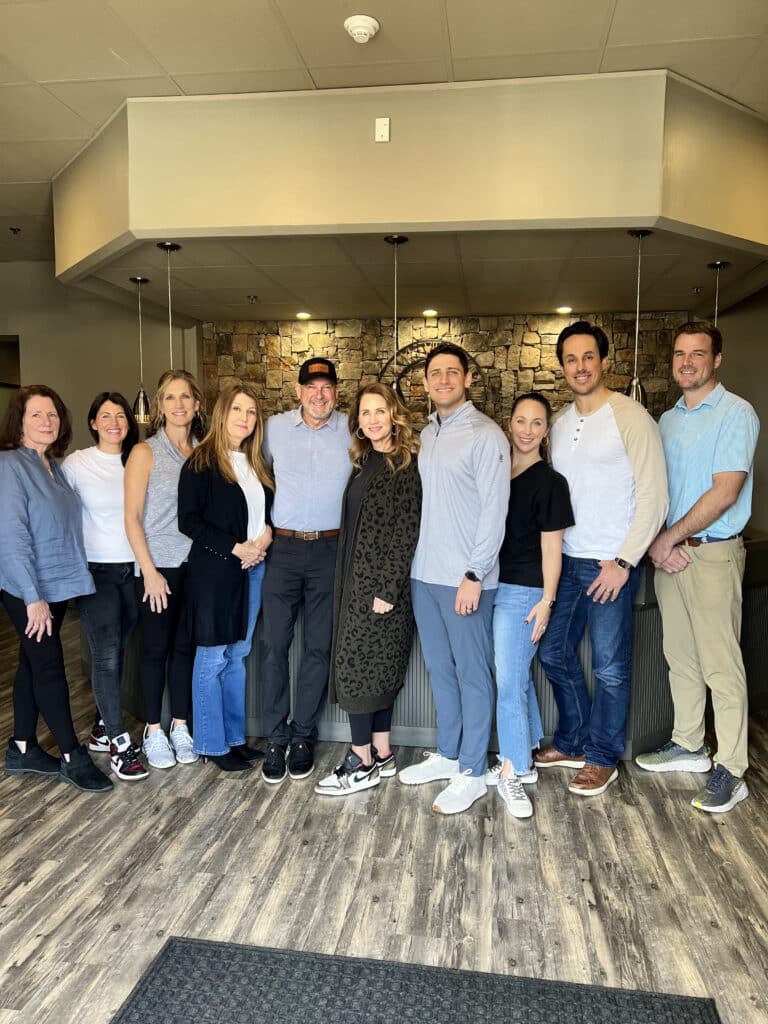
The company’s flagship product is the Guardian Cap, which was created to advance the standard football helmet by dispersing some of the energy that is generated during impacts. Check out a video HERE.
Insight Sourcing celebrated 20 years in business, announcing 20% firmwide growth in 2022, with 84 new team members added, of whom 23 joined as part of an acquisition.
Global Aviation celebrated 25 years of success while at the same time launching another company in the aerospace industry.
In February, the city began encouraging businesses to connect their security cameras with the Fusus network. Fusus is a nationally recognized public safety technology provider that has operated out of its headquarters in—you guessed it–Peachtree Corners since 2019.
The platform links cameras together and sends the feed to the West Precinct where Gwinnett Police officers can see situations in real-time and respond accordingly.
The cameras have helped solve homicides and other crimes in various cities, including Peachtree Corners. In July, Fusus made the annual Inc. 5000 list, the most prestigious ranking of the fastest-growing private companies in America.
Peachtree Farm, located in Technology Park, began attracting some attention on a grand scale this year, starting with a visit from Arthur Tripp Jr., the executive director of the USDA Farm Service Agency who visited Peachtree Farm in February.
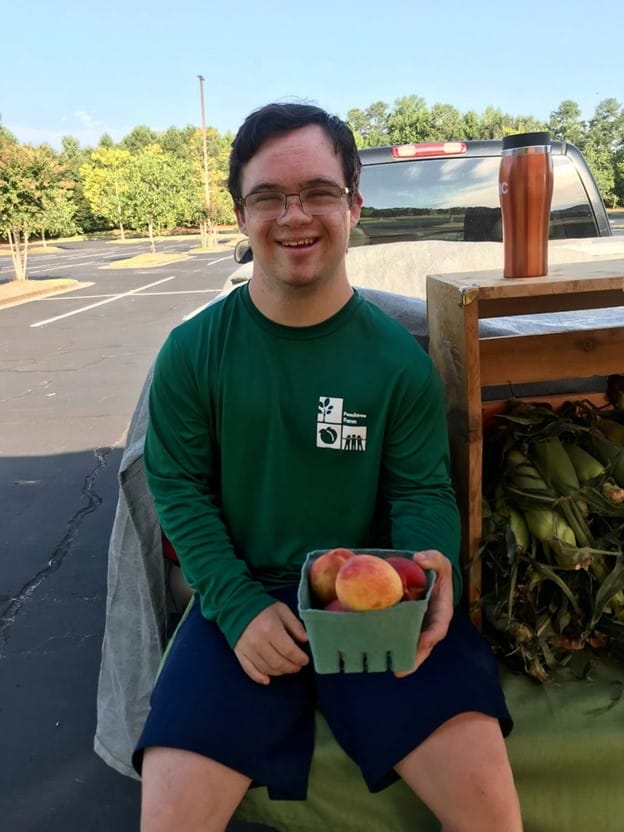
Members of the Gwinnett County Farm Bureau and the Georgia Farm Bureau also visited Peachtree Farm in June to learn more about its operations and areas for possible collaboration.
Congresswoman Lucy McBath visited the farm this fall. The farm, located on Research Court, provides an inclusive and accessible community fostering the social, emotional and physical health and wellness of adults with disabilities.
Peachtree Farm first opened in 2021 to create jobs for those with intellectual and developmental disabilities.
In April, professional cyclists descended on Technology Parkway participating in the Curiosity Lab Criterium, a series of races on the streets of Peachtree Corners within the living laboratory environment of Curiosity Lab.
In May, North American Properties broke ground on The Forum redevelopment project, a great relief as there had been concerns about how to best generate more activity at the 20-year-old center.
North American Properties is redeveloping and revitalizing the property, adding a boutique hotel, food hall, open green spaces, new retail spaces and 381 apartments.
A 300-space parking deck will be constructed near Belk to allow for some parking to be reconstructed as open green space. Several new stores and restaurants have opened or are opening at The Forum, including Peche, lululemon and High Country Outfitters as well ass Petfolk Veterinarian clinic.
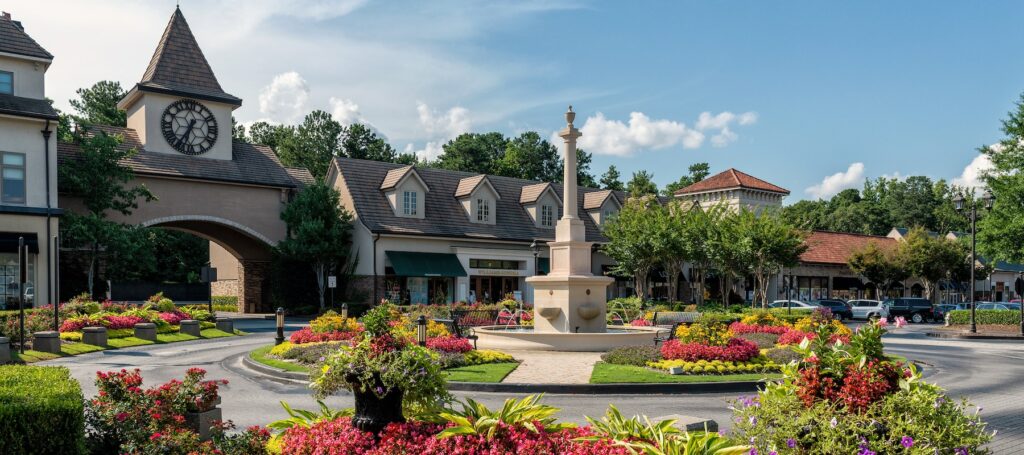
Politan Row will open at the Forum, part of the multi-million dollar renovation project by North American Properties. Politan Row, which has locations at Colony Square in Atlanta, as well as Houston and Chicago, will include seven independently owned restaurant spaces, a full bar, an outdoor patio along greenspace and a standalone restaurant and wine bar.
The German American Chamber of Commerce visited Curiosity Lab in May to learn more about Georgia, Gwinnett County and specifically Peachtree Corners. Also, a delegation of energy, technology and sustainability leaders visited the City of Peachtree Corners in October for several days, learning about area companies, Curiosity Lab and about how the city developed.
This year, Seoul Robotics established its United States office in Curiosity Lab at Peachtree Corners. The company’s presence in Curiosity Lab is fueling further development of a groundbreaking 3D perception platform.
Also this year, Siemens joined Curiosity Lab to support bringing 5G charging and electrification solutions to the United States.
Soliant, a leading provider of specialized healthcare and education staffing services, has been hiring hundreds of new employees across five offices in the Southeast. This expansion of approximately 300 people will give Soliant the internal resources to meet the growing nationwide demand for healthcare and education professionals.
Also, in terms of health and wellness, Atlas Behavioral Health opened at 3850 Holcomb Bridge Road while space was outfitted in June at 4941 S Old Peachtree Road for a Fyzical Therapy and Balance Center.
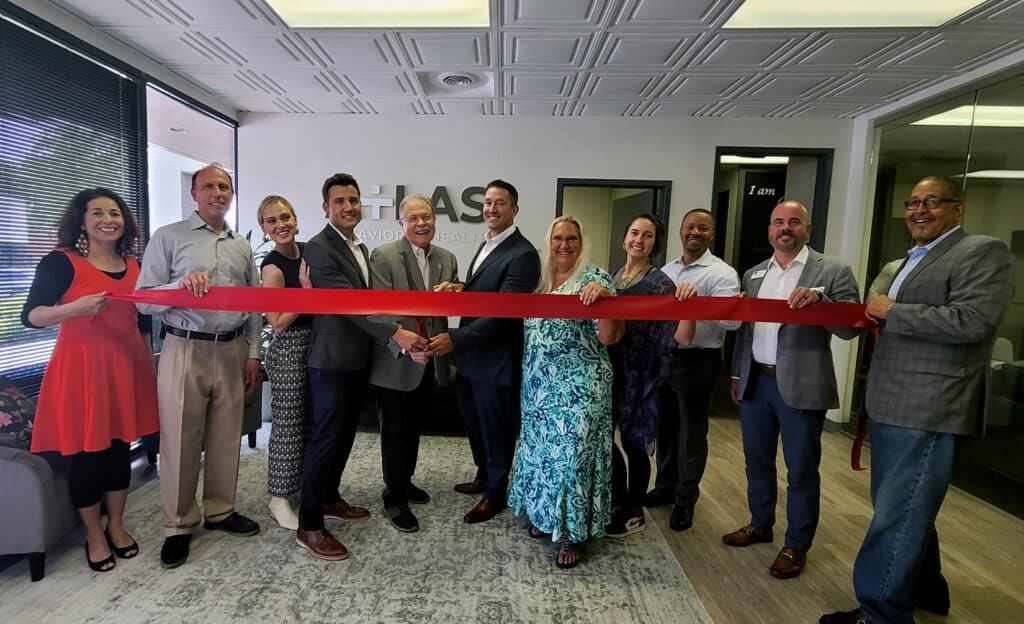
In June, Peachtree Corners was ranked #1 in Georgia and #19 in the nation in this year’s edition of the Fortune 50 Best Places to Live for Families. In August, Peachtree Corners was listed as one of the best places to live in Georgia by Niche.com.
On the environmental front, I can think of a few things coming out of Peachtree Corners this year which will likely help the world.
For example, Sidel, which manufactures packaging (among other things), has introduced a new bottle. Sidel announced a partnership with Coca-Cola Europacific Partners.
The company has been experiencing a great deal of growth and continues to hire more and more people. The bottle, which is for carbonated soft drinks, has a lighter neck and tethered cap. The tethered caps are expected to boost collection and recycling efforts, while preventing litter.
Pond Constructors Inc., Peachtree Corners, was awarded a $13 million modification contract to maintain and repair capitalized petroleum systems and facilities at the Joint Base Pearl Harbor-Hickam, Hawaii.
Also, ASHRAE (the American Society of Heating Refrigerating, and Air Conditioning Engineers) has published a pioneering code-enforceable standard developed to reduce the risk of infectious aerosol transmission in buildings.
There was some other activity in Technology Park as well. Specifically, ASBN Coworks opened at 420 Technology Parkway, in the heart of Tech Park.
DW1, previously known as Discount Waste, Inc., cut the ribbon on its new office at 250 Scientific Drive NW.
A Florida-based investment firm acquired four properties in Technology Park in August, all part of a portfolio selling for roughly $23.8 million.
The second-largest sale in Metro Atlanta that quarter, SF Partners purchased 30, 35 Technology Parkway South and 190 and 192 Technology Parkway from Terracap; a total of 247,208 square feet.
Thank you for reading about some of the impressive business happenings in our city this year. As we gear up for 2024, we looked forward to hearing about more successes, and helping to make sure the city’s businesses continue to grow and thrive.
Happy Holidays!
Mike Mason, Mayor
Related
Read the Digital Edition
Subscribe
Keep Up With Peachtree Corners News
Join our mailing list to receive the latest news and updates from our team.
You have Successfully Subscribed!

April/May Events Going on at Gwinnett County Parks

8 Theatrical Performances Coming to the Peachtree Corners Area

Enter Our Readers’ Choice Awards 2024

North American Properties Secures 3 New Brands for The Forum

Georgia United Methodist Foundation Announces Changes to Finance Team

Exploring Israeli Innovation in the Smart City Sector with Einav Gabbay [Podcast]

North American Properties Revitalizes Avenue East Cobb

BRACK: Peachtree Corners to lose Peterbrooke Chocolatier

BRACK: Peachtree Corners to lose Peterbrooke Chocolatier

Georgia United Methodist Foundation Announces Changes to Finance Team

North American Properties Revitalizes Avenue East Cobb

Exploring Israeli Innovation in the Smart City Sector with Einav Gabbay [Podcast]

North American Properties Secures 3 New Brands for The Forum

April/May Events Going on at Gwinnett County Parks

8 Theatrical Performances Coming to the Peachtree Corners Area

Enter Our Readers’ Choice Awards 2024

Light up the Corners [Video]

Capitalist Sage: Business Leadership in Your Community [Podcast]

Cliff Bramble: A Culinary Adventure through Italy

Top 10 Brunch Places in Gwinnett County

A Hunger for Hospitality

THE CORNERS EPISODE 3 – BLAXICAN PART 1

Top 10 Indoor Things To Do This Winter

The ED Hour: What it takes to Remove Barriers from Education
Peachtree Corners Life
Topics and Categories
Trending
-
Parks & Recreation1 week ago
April/May Events Going on at Gwinnett County Parks
-
Arts & Literature1 week ago
8 Theatrical Performances Coming to the Peachtree Corners Area
-
Readers' Choice Awards1 week ago
Enter Our Readers’ Choice Awards 2024
-
Business1 week ago
North American Properties Secures 3 New Brands for The Forum













